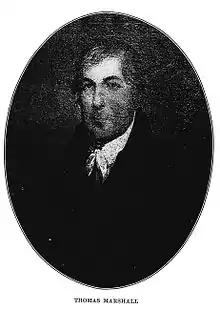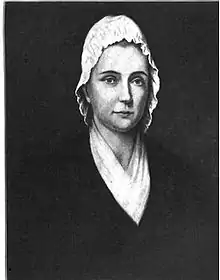Thomas Marshall (Virginia politician, born 1730)
Thomas Marshall (Washington parish, Westmoreland County, Virginia, 2 April 1730 – Mason County, Kentucky, 22 June 1802) was a United States soldier and politician, best known as the father of Chief Justice of the United States Supreme Court John Marshall.

Biography
Marshall was the son of "John of the Forest," so called from the estate that he owned, and was educated in Rev. Archibald Campbell's school, and subsequently assisted George Washington in his surveying excursions for Lord Fairfax and others, for which he received several thousand acres of land in West Virginia. He was a lieutenant of Virginians in the French and Indian War, and participated in the Braddock Expedition against Fort Duquesne, but, having been detailed as one of the garrison at Fort Necessity, was not at the defeat.
In 1753 he accepted the agency of Lord Fairfax to superintend a portion of his estate in the "Northern neck," and in 1754 married Mary Randolph Keith, daughter of Rev. James Keith, an Episcopal clergyman of Fauquier County and Mary Isham Randolph of the influential Randolph family of Virginia.

In 1765 he moved to Goose Creek, and in 1773 purchased "The Oaks" (or "Oak Hill") in Leeds parish in the northern part of Fauquier County. In 1767 he was high sheriff of Fauquier County, and he was frequently a member of the Virginia House of Burgesses. He condemned and pledged resistance to the encroachments of the crown, and was a member of the Virginia convention that declared her independence.
In 1775, on the summons of Patrick Henry, he recruited a battalion and became major of a regiment known as the "Culpeper Minutemen." He afterward became colonel of the 3rd Virginia Regiment. At the Battle of Brandywine, his command was placed in a wood on the right, and, though attacked by greatly superior numbers, maintained its position without losing an inch of ground until its ammunition was nearly expended and more than half its officers and one third of the soldiers were killed or wounded. The safety of the Continental Army on this occasion was largely due to the good conduct of Colonel Marshall and his command. The House of Burgesses voted him a sword. At Germantown, his regiment covered the retreat of the Continental Army. He was with Washington at Valley Forge, Pennsylvania. He was afterward ordered to the south, and was surrendered by General Lincoln at Charleston in 1780. When paroled he took advantage of the circumstance to make his first visit to Kentucky on horseback over the mountains, and then located the lands on which he subsequently lived in Woodford. Having been exchanged, he resumed his command and held it until the close of the war. In 1781 he was for a time in command at York.
He was appointed surveyor general of the lands in Kentucky in 1783, in that year established his office in Lexington, and removed his family to Kentucky in 1785. In 1787 and 1788 he represented Fayette County in the Virginia House of Delegates.[1] In the latter year he was also a delegate to the convention in Danville to consider the separation of Kentucky from Virginia. He was appointed by Washington collector of revenue for Kentucky. He and his immediate family were all Federalists.
Family
Besides John Marshall, Thomas Marshall fathered, and his wife Mary Isham Keith gave birth to, fourteen other children who all lived well into adulthood. Their most notable children were: Thomas Marshall (born in Fauquier County, 27 October 1761; died in Mason County, Kentucky, 19 March 1817), who served in the American Revolution, attained the rank of captain, settled in Kentucky in 1790, and was an active member of the convention that formed the second constitution of the state in 1799; James Markham Marshall, a lawyer who was a federal judge for a short time and performed diplomatic errands for the U.S. government; Alexander Keith Marshall (born in Fauquier County in 1770; died in Mason County, Kentucky, 7 February 1825), a lawyer; Louis Marshall, a physician and later an educator, as the subsequent president of two U.S. colleges and two other sons, born as twins on January 31, 1767, who also became lawyers, William Marshall and Charles Marshall.[2]
Thomas Marshall's brother William (born in Washington parish, Westmoreland County, Virginia, in 1735; died near Eminence, Kentucky, in 1809) moved to Fauquier County in 1752, became a Baptist clergyman, and, owing to his zealous preaching and influence, was arrested. In 1780 he moved to Kentucky and established in Henry County the Fox River Church.
Thomas Marshall's grandfather, also named Thomas (born in Virginia about 1655; died in Westmoreland County, Virginia, in 1704), was a planter. The grandfather's father, John, was a captain of cavalry in the service of Charles I, and emigrated to Virginia about 1650, and owned a large plantation there.
Notes
- Kromkowski, Charles A. "The Virginia Elections and State Elected Officials Database Project". University of Virginia Library. Retrieved 2013-07-03.
- Marshall Family, Rootsweb listing on Ancestry.com
References
- This article incorporates text from a publication now in the public domain: Wilson, J. G.; Fiske, J., eds. (1900). . Appletons' Cyclopædia of American Biography. New York: D. Appleton.